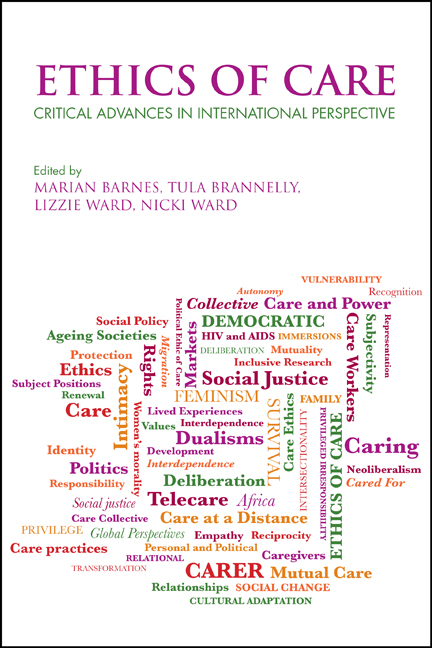Five - Care ethics, intersectionality and poststructuralism
Published online by Cambridge University Press: 08 March 2022
Summary
Introduction
Notions of identity, intersectionality and poststructuralism all involve a consideration of what it is to be ‘other’. As Simone de Beauvoir suggests:
‘Otherness is a fundamental category of human thought. Thus it is that no group even sets itself up as the One without at once setting up the Other’ (1972, p 17).
While notions of ‘the one’ and ‘the other’ still inform understandings of identity, the categories that constitute oneness or otherness have become increasingly complex. The rise of poststructural ways of understanding the world and the development of our understanding of intersectionality have, since their emergence in the latter part of the 20th century, become increasingly significant. The disruption of the old sureties of identity through the interrogation of binary distinctions, along with the shrinking world of cross-cultural relations, migration and globalisation, have all served to demonstrate the myth of the presumption that identity was fixed and representative of a particular and immutable relationship to social structures.
Here, the concept of poststructuralism accorded with the critiques developed by black feminist thinkers in relation to intersectionality, which illustrated that the experience of women was not a homogenous one, but was differentiated across lines of ‘race’, class and power. So, as Crenshaw (1991, p 1242) notes, the concern was not that identity politics failed to address and rise above issues of difference, but that it was inclined to ignore or conflate the differences between groups. The argument for an intersectional analysis was that the experiences of black women could be fully understood only by considering how experiences of race and gender intersected in those women's lives, rather than by treating them as separate categories. The poststructuralist critique of essentialism and homogenising notions of identity was seen to offer a challenge to universalism and to ‘open up new possibilities for the construction of self and the assertion of agency’ (hooks, 1991, p 28).
The ability to think intersectionally requires openness, awareness of fluidity and the willingness to interrogate power (Crenshaw, cited in Adewunmi, 2014). It is this openness and fluidity that has led to the consideration of different lines of intersectional analysis.
- Type
- Chapter
- Information
- Ethics of CareCritical Advances in International Perspective, pp. 57 - 68Publisher: Bristol University PressPrint publication year: 2015



